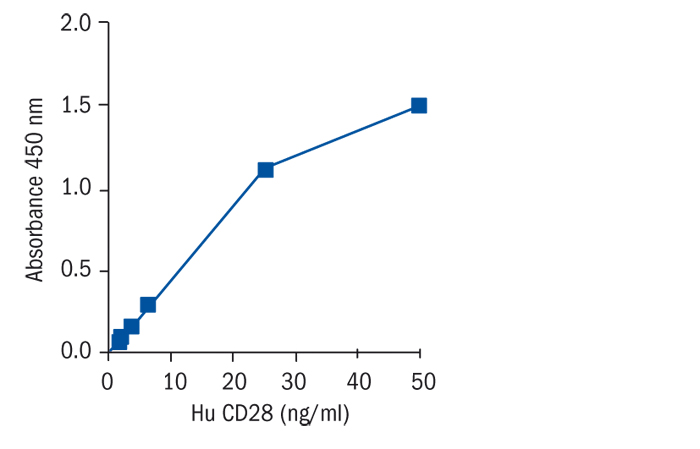Type
Sandwich ELISA, Biotin-labelled antibody
Applications
Serum, Cell culture supernatant
Sample Requirements
50 µl/well
Shipping
At ambient temperature. Upon receipt, store the product at the temperature recommended below.
Storage/Expiration
Store the complete kit at 2–8°C. Under these conditions, the kit is stable until the expiration date (see label on the box).
Calibration Curve
Calibration Range
0.8–50 ng/ml
Limit of Detection
0.18 ng/ml
Intra-assay (Within-Run)
CV = 5.9%
Inter-assay (Run-to-Run)
CV = 7.2%
Spiking Recovery
117,00%
Dilution Linearity
105,00%
Research topic
Cell surface proteins (sCD)
Summary
The cluster of differentiation (CD) antigen CD28 is a 44 kDa, disulphide-bonded, homodimeric glycoprotein, which is constitutively expressed on the surface of the majority of T-cells.
CD28 is structurally very closely related to another molecule expressed in activated T-cells, CTLA-4. In particular, the hinge region is completely conserved for both molecules. Also CTLA-4 and CD28 were shown to be very similar at the message and at the gene structure level. The corresponding genes co-map on Human chromosome 2q33.
Ligation of CD28 by its counter receptor, B7, expressed on the surface of antigen presenting cells, has been shown to induce signals that, in synergy with those derived from engagement of the T-cell receptor by an antigen bound to a major histocompatibilty complex, enhance proliferation and cytokine production. Manipulation of this interaction can have dramatic effects on the outcome of T-cell activation. Considerable research has been done on the CD28/B7 costimulatory pathway. Blocking thereof results in immunosuppression with implications for the treatment of autoimmune diseases, allergy, organ transplantation and graft versus host disease.
Activating the CD28/B7 pathway could be useful for including the immune system to recognize and eliminate tumors that evade the immune system.
Find documents for the lot
Example Instructions for Use (RUO)
Example Instructions for Use (RUO)
Safety Information (RUO)
MSDS (RUO)

